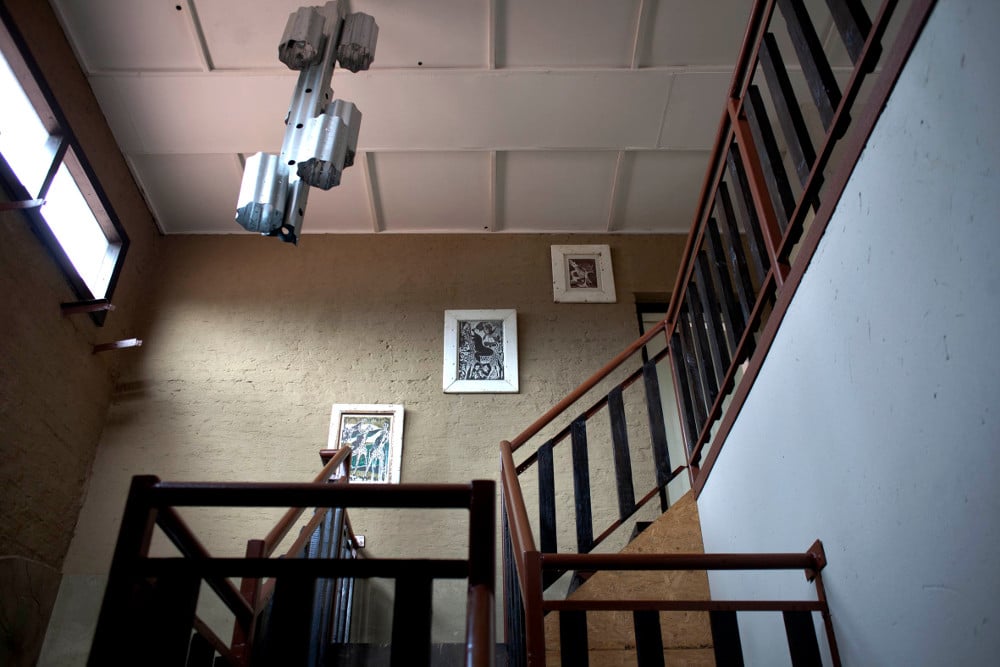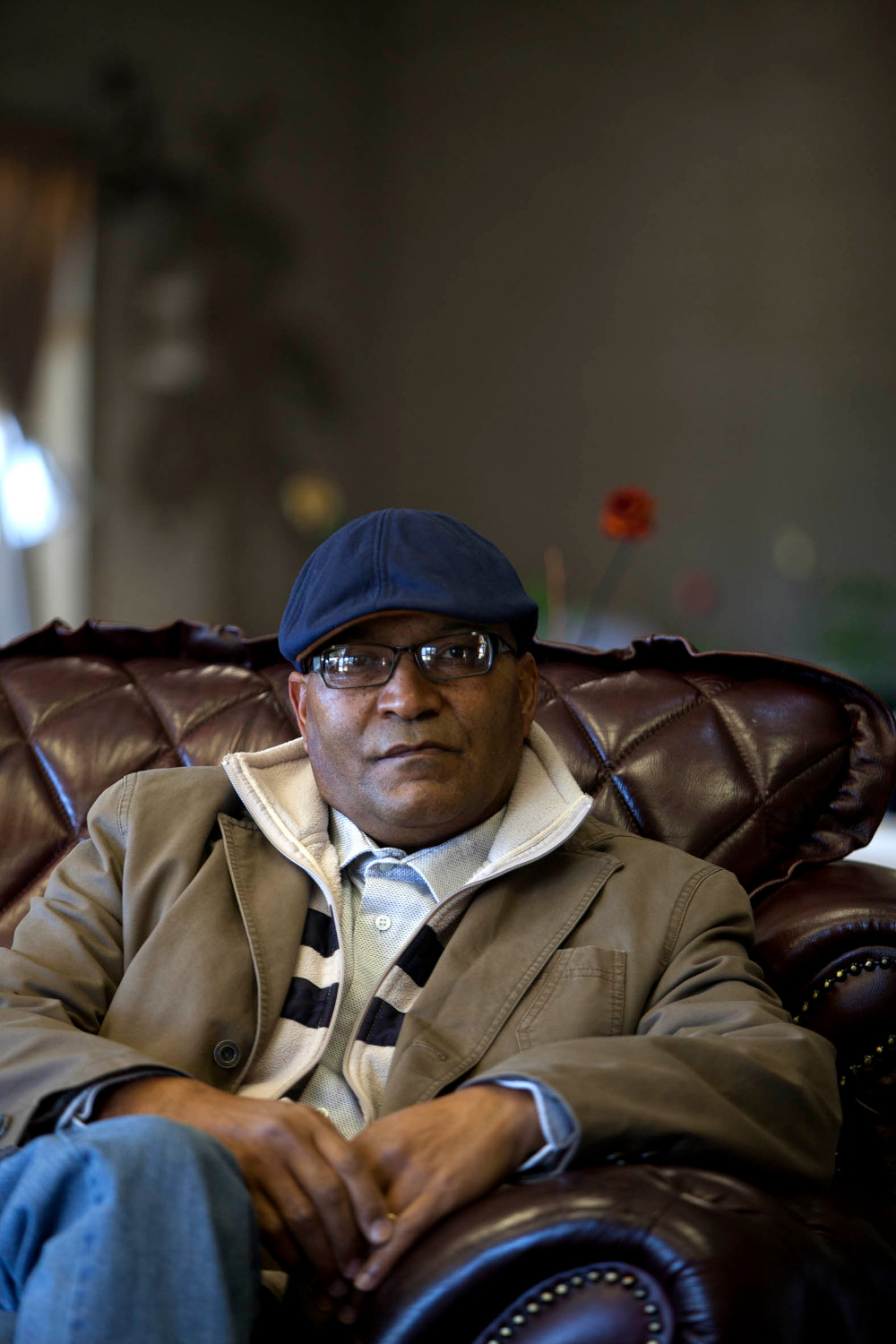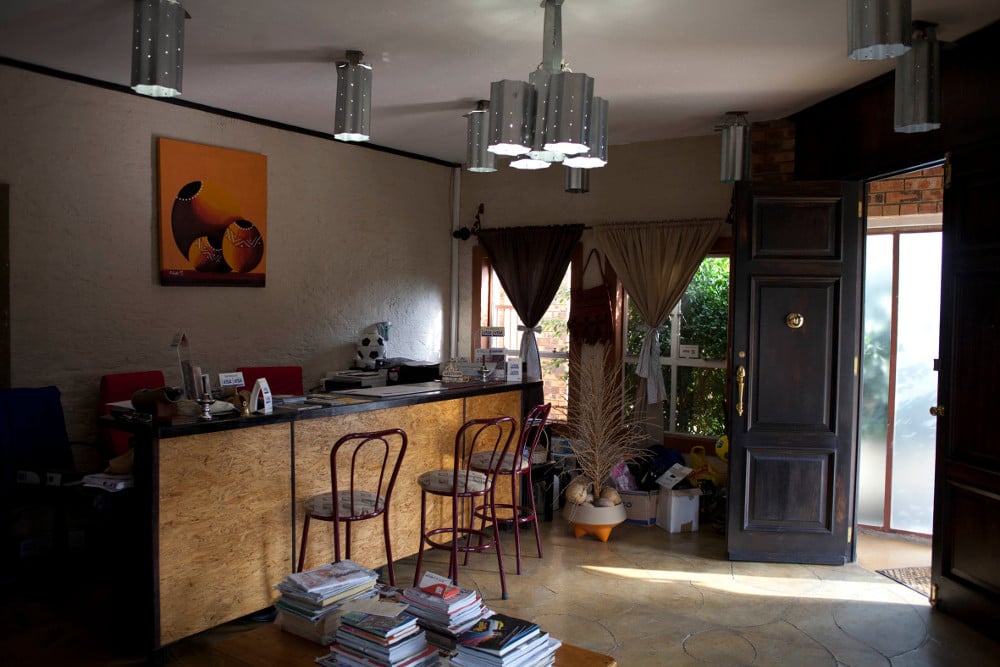“You have to pull yourself up by the bootstraps. You can’t sit about and wait for help and then spend everything you have buying new things off the shelf.” Leaning back in his brown leather armchair, Mike Bobby taps the plush upholstery.
“I found this set being thrown away and asked if I could have them instead.” The armchair looks new, giving off a creak every time he moves. He moves a lot, constantly shifting to express himself with animated hands.
Bobby has internalised the government mantra of “reduce, reuse and recycle”. He now has different projects running across three plots in the suburb of Meredale, to the south of Johannesburg. Pulling down on his camouflage-print baseball cap, he says the first empty lot was bought in 2002. He wanted to build a bed and breakfast, but no bank would extend him a loan.
“We didn’t have the money to get to our dream, so we became innovative.” Having grown up in a household that didn’t waste – everything was stored for later use – Bobby decided to use building waste and recycled material to get his B&B going.

Mike Bobby finally has somewhere to hang the paintings he’s been hoarding for four decades. (Photos: Oupa Nkosi, M&G)
He walked down to the neighbourhood Pikitup depot and stuck up a sign asking for any builders’ waste to rather be dropped at his house. Builders normally have to pay to dump this sort of waste. “Soon, I was having bakkie loads of waste. We piled it up and sorted it, then got to work.” Three years later, the six-bedroomed KwaEden B&B and attached conference facility were open for customers. Ninety percent of the structure has been made from recycled material.
“You would be amazed with what gets thrown away,” he says.
Chain sale
The furniture in the reception area comes from a Mugg & Bean sale. Large LED lights illuminate the room, fitted in metal cones that he welded from waste. The reception desk is an old frame with a chipboard panel. None of it looks cheap or unfinished, but all of it looks different from the usual garb that is fitted in B&Bs.
Old paintings on the wall have been with him for four decades, waiting for a place to be hung. Now, three wrestle to take a visitor’s attention away from his heavy home-made wooden staircase. The red roof tiles come from a school he helped demolish 30 years ago. The dining room tables were rescued from a building site fire he happened to be driving past. He is always on the lookout for new material when he’s out driving, he says.

KwaEden owner Mike Bobby.
“It will probably take a little longer than it would if you had all the money at your disposal,” he says at the top of the stairs. A massive 20-seater conference table upstairs was given to him by someone who liked his project. The back garden outside the window is filled with material, all sorted according to type and size: waiting for the next project.
“Sometimes I sit and I watch the sport. But I am always thinking of the next project. Life is too short to just wait,” Bobby says with the smile that hardly leaves his face.
The property next door was bought before the 2010 World Cup for extra accommodation. Next was the neighbourhood shop that specialised in sauce-filled chip rolls. His team of six workers is going through it, knocking partitions down and building en-suite rooms for guests. Two of the employees artfully work with a hammer and angle grinder to shape burglar bars. “Most of the guys that work with me now understand that you don’t just throw things away,” says Bobby.
Bobby’s philosophy
Wrapping his large hands over a newly painted red railing, he says he tries to extend his philosophy to everything he does. “I used to say everyone who works here would spend an hour each morning in the garden. They didn’t like it because it is supposed to be the realm of women. But soon they saw they could grow their own food in the space of a door, and they took the idea home.”
A 50-room hotel is next on the cards. The bricks are already piled up around the construction site. A bakkie arrives with new steel for the site – the only new materials on his building site are cement, face bricks and some metal.

Mike Bobby cobbled together the reception area from things that other people had thrown away. Cities’ landfills are nearing capacity and emulating his example will help alleviate this problem.
“In South Africa people say we have huge problems. They say we have unemployment.” Bobby stops to think and says: “This will get me into trouble. But we shouldn’t have unemployment. As soon as people know what they are able to do, everyone will be working.” He estimates that his recycling has saved him at least R1-million in construction costs.
“That means I own all of this,” he says standing on the lawn, its yellow grass dull in the winter sun. “The bank can’t come and take it from me.”
Bobby’s ideas may soon have to be replicated. With Johannesburg’s waste dumps nearing capacity, the city has said that most waste must be recycled before it gets to the landfill. He is willing to help.
He has already shared his ideas with neighbours. “We need to see our waste as something valuable. Don’t just chuck away and buy new things; work with your hands and create.”